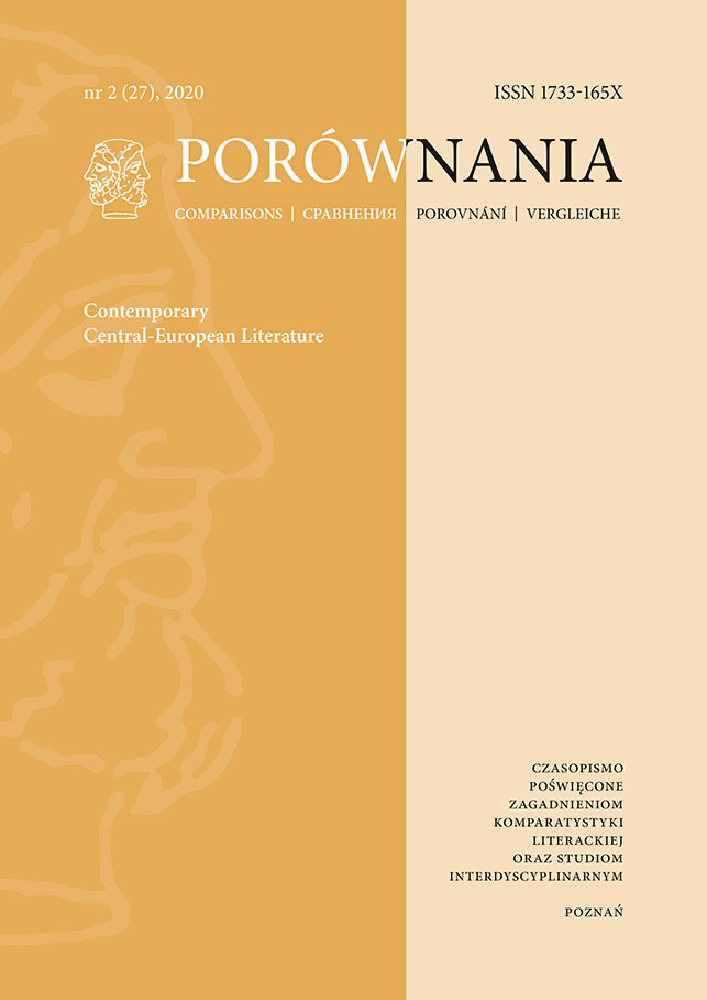Abstrakt
This article investigates contemporary Hungarian women’s writing in the context of cosmopolitan feminism. The literary works explored are Noémi Szécsi’s The Finno-Ugrian Vampire, Noémi Kiss’s Trans and Virág Erdős’s Luminous Bodies: 100 Little Budapest, which I read as examples of a cosmopolitan feminist engagement with urban space. As opposed to the Kantian concept of cosmopolitanism, which has been critiqued for failing to take the experiences of particular social groups and geographical regions into account, cosmopolitan feminism focuses on the local and the embodied. The discussed texts thematise border crossing both on the level of form and content, while they engage with the mundane, affective aspects of everyday life in an emphatically urban setting. This cosmopolitan feminism challenges parochial, heavy, national literary traditions and points towards a distinct feminist
aesthetics in contemporary Hungarian literature.
Reference
Erdős, Virág. Világító testek: 100 kis Budapest. Budapest: Magvető, 2016.
Fábián, Katalin. Contemporary Women’s Movements in Hungary: Globalization, Democracy, and Gender Equality. Baltimore: The John Hopkins UP, 2009.
Farkas Anita. “Irodalmi nemek.” Demokrata 17 February 2010, https://tinyurl.com/y5zexons. Accessed 18 August 2019.
Fischer, Tibor. “The Finno-Ugrian Vampire by Noémi Szécsi.” The Guardian 12 October 2012, https://tinyurl.com/y74xrhw9. Accessed 18 August 2019.
Fischer, Tibor. Under the Frog. London: Penguin, 1993.
Fitzgerald, Ruth P. and Maila Stevens. “Editorial for Special Section ‘Gendering Cosmopolitanisms: Recognition, Belonging and Difference,’ Women’s Studies International Forum.” Women’s Studies International Forum 67 (2018): 80–84.
Forgács, Zsuzsa Bruria, Agáta Gordon and Bódis Kriszta. Night Time Zoo: Anthology about Female Sexuality. Budapest: Jonathan Miller, 2005.
Hawkesworth, Celia, ed. A History of Central European Women’s Writing. London: Palgrave Macmillan, 2001.
Horváth, Györgyi. Utazó elméletek: Angolszász politizáló elméletei kelet-európai kontextusban. Budapest: Balassi Kiadó, 2014.
Jackson, Kevin. “The Next Generational Zadie Smith.” The New Yorker, 18 October 1999, https://tinyurl.com/ybpzzdpz. Accessed 30 January 2020.
Kiss, Noémi. Ikeranya. Budapest: Magvető, 2013.
Kiss, Noémi. Trans. Budapest: Magvető, 2006.
Kiss, Noémi. “Passage to a Detour.” Hungarian Literature Online, https://tinyurl.com/y5rrwaw3. Accessed 6 September 2019.
Lennert, Tímea. “A Kitakart Psyché utóéletei.” Irodalmi Jelen, 11 May 2012, https://tinyurl.com/yakg47ng. Accessed 18 August 2019.
Nádas, Péter. “A kettős látás dícsérete: Zsuzsa Bánk írt egy velejéig magyar regényt németül.” Élet és Irodalom 15 Nov, 2002. Online.
Orzóy, Ágnes. “‘I Like Being an Outsider’: Interview with Noémi Szécsi.” Hungarian Literature Online, 10 Dec. 2012, https://tinyurl.com/y2eobfcq. Accessed 18 August 2019.
Parsons, Deborah. Streetwalking the Metropolis: Women, City and Modernity. Oxford: Oxford University Press, 2000.
Pető, Andrea. “Hungarian Women’s Writing 1945–95.” A History of Central European Women’s Writing. Ed. Celia Hawksworth. London: Palgrave Macmillan, 2001. 240–255.
Rácz, Péter. “Ex Libris.” Élet és Irodalom 51.6 (2007), https://tinyurl.com/y6kktm25. Accessed 6 September 2019.
Rich, Adrienne. “Notes towards a Politics of Location (1984).” Blood, Bread and Poetry: Selected Prose, 1979–1985. New York: W. W. Norton and Company, 1986. 210–231.
Shands, Kerston W. Embracing Space: Spatial Metaphors in Feminist Discourse. London: Greenwood, 1999.
Séllei, Nóra. Miért félünk a farkastól? Feminista irodalomszemlélet itt és most. Debrecen: Kossuth Egyetemi Kiadó, 2007.
Szécsi, Noémi. Finnugor vámpír. Budapest: Kijárat Kiadó, 2002.
Szécsi, Noémi. The Finno-Ugrian Vampire. Trans. Peter Sherwood. London: Stork Press, 2012.
Szilva, Eszter. “A Women’s Turn in Literature? Women’s Literature in Hungary in the Last Decade and its Connections to Feminist Politics.” MA Thesis, Central European University, 2011.
Szolláth, Dávid. “Inventory of Magical Textual Constructions of the Unnatural in Hungarian Postmodern Fiction.” Neohelicon 45 (2018): 461–477.
Upstone, Sarah. “‘Same Old, Same Old’: Zadie Smith’s White Teeth and Monica Ali’s Brick Lane.” Journal of Postcolonial Writing 43.3 (2007): 336–349.
Várnagyi, Márta. “A női irodalom és a feminist irodalomkritika Magyarországon: Hangok és visszhangok.” Társadalmi Nemek Tudománya Interdiszciplináris eFolyóirat 1.1 (2011): 23–35.
Vieten, Ulrike M. Gender and Cosmopolitanism in Europe: A Feminist Perspective. London: Routledge, 2012.
Wilson, Elizabeth. The Contradictions of Culture: Cities, Culture, Women. London: SAGE, 2001.
Wilson, Elizabeth. The Sphinx in the City: Urban Life, the Control of Disorder, and Women. Berkeley: University of California Press, 1992.
Woolf, Virginia. Three Guineas. London: Harvest, 1966.
Licence
Utwory opublikowane w czasopiśmie „Porównania”, na platformie Pressto należącej do Uniwersytetu im. Adama Mickiewicza w Poznaniu są udostępniane na licencji Creative Commons Uznanie autorstwa - Bez utworów zależnych 4.0 Międzynarodowe (CC BY-ND 4.0)
Tym samym wszyscy zainteresowani są uprawnieni do korzystania z utworów opublikowanych pod następującymi warunkami:
-
uznania autorstwa — czyli obowiązek podania wraz z rozpowszechnianym utworem informacji o autorstwie, tytule, źródle (odnośniki do oryginalnego utworu, doi) oraz samej licencji
-
bez utworów zależnych — remiksując, przetwarzając lub tworząc na podstawie utworu, nie wolno rozpowszechniać zmodyfikowanych treści.
-
brak dodatkowych ograniczeń — nie można korzystać ze środków prawnych lub technologicznych, które ograniczają innych w korzystaniu z utworu na warunkach określonych w licencji.
Uniwersytet im. Adama Mickiewicza w Poznaniu zachowuje prawo do czasopisma jako całości (układ, forma graficzna, tytuł, projekt okładki, logo itp.).
Autor zachowuje prawa majątkowe, ale udziela zgody Uniwersytetowi im. Adama Mickiewicza w Poznaniu na wykorzystanie dzieła. Autorzy tekstów zakwalifikowanych do publikacji proszeni są o wypełnienie podpisanie i przesłanie umowa (PL) agreement (EN)
Agreement for granting a royalty-free license to works with a commitment to grant a CC sub-license




